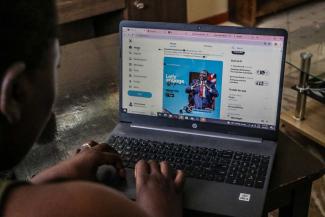Youth movements
Why Kenya’s youth is taking to the streets
 picture-alliance/ZUMAPRESS.com/James Wakibia
picture-alliance/ZUMAPRESS.com/James Wakibia
The proposed bill foresaw a significant increase in taxes on everyday goods and services such as sanitary towels, digital transactions, mobile data, bread and cooking oil. Millions of people in Kenya live in poverty. It was therefore clear that they would be especially affected by the tax increases.
Initially, the uproar took place online, where young people voiced their discontent on platforms such as WhatsApp, X, TikTok and Instagram. At the end of June, they began to take to the streets. The demonstrations quickly gained momentum. After tear gas and water cannons proved ineffective against the initially peaceful crowd, the police fired live ammunition in downtown Nairobi on 25 June. Thousands of demonstrators then stormed the parliament building and partially set it on fire. At least 50 people died in the ensuing chaos and in further demonstrations since then, and hundreds were injured.
“Hustler nation” rising
In the end, President Ruto gave in to the protesters’ demands and did not sign the proposed taxes into law. But the GenZ and Millennial protesters, as they call themselves, were not satisfied with this. They are demanding far-reaching reforms, massive cuts in politicians’ salaries and government spending – and the resignation of the president and his government. And they continued to record such major successes that some people are still rubbing their eyes: Ruto dissolved his cabinet in mid-July.
The country seems to be in a frenzy. Young people make up the majority of Kenya’s population, with an average age of 19. Ruto collected votes in the last elections by invoking Kenya as a “hustler nation” of young, hard-working people and promising them jobs during his election campaign. The promised jobs did not materialise, the country’s economy is in a constant state of crisis due to horrendous debt and inflation – and young people feel betrayed and angry.
With the demonstrations, the young people took back some of their agency.
Dennis Ndolo, a soccer referee in his mid-20s, says that taking part in the demonstrations was a highlight that he will remember for a long time. He believes it is important that the youth stand united. “There is no leader, no famous politician or anyone else leading the way. And for the first time, a movement in Kenya is not taking tribal identities into consideration,” he says. “We are marching as Kenyans.”
The movement chose not to delegate any leaders to speak to the government after the president asked them to do so. The decision was made because this would have exposed individuals to the risk of being easily intimidated, bribed or even abducted. For the same reasons, the movement vehemently defends itself against capture by individual opposition politicians or others and does not want to be harnessed by any party. Instead, the movement has many prominent faces, who come from universities, are street activists or influencers.
After refusing to speak directly to the president, the movement decided to issue a counter-invitation and asked Ruto to participate in an anonymously moderated online meeting. Contrary to expectations, the president agreed to talk to the young people via X Spaces, a feature of the platform that enables live audio conversations. This was a first for the country and most likely for the continent.
The unexpected success of the demonstrations can be attributed, at least in part, to the digital savviness of the protesters and their creativity and innovation in using digital platforms. They spread information about the protests, broadcast live from the demonstrations, create viral memes and videos and thus mobilise more people. They understand the power of platforms like X, Instagram, YouTube, Facebook and TikTok.
Alba Nakuwa is a South Sudanese freelance journalist based in Nairobi, Kenya.
albanakwa@gmail.com



